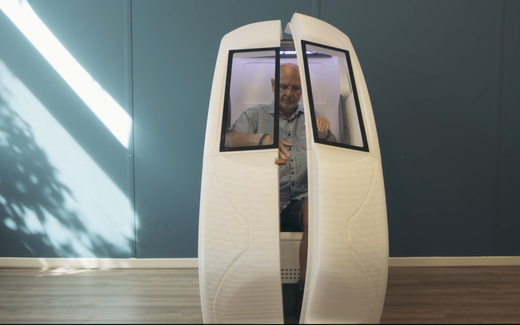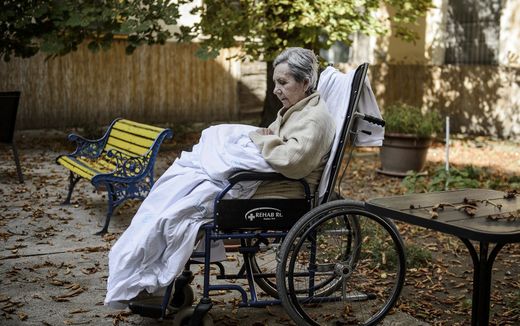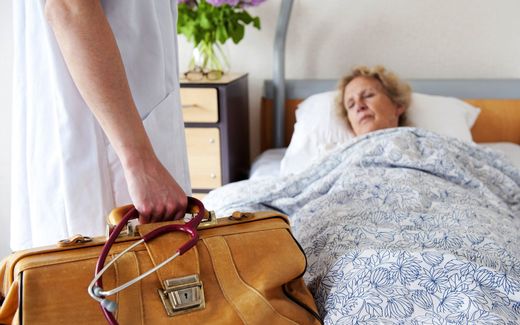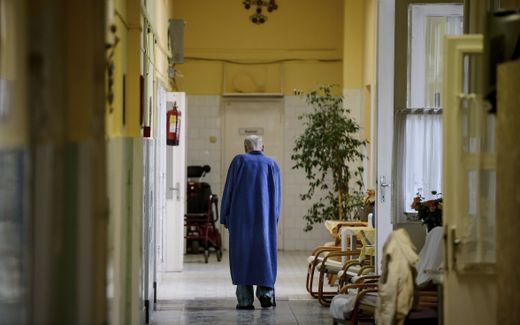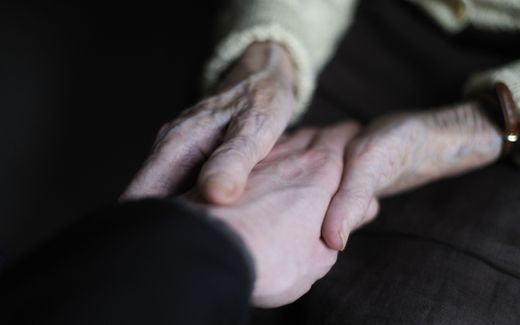Assisted suicide capsule ‘Sarco’ set for release throughout Switzerland
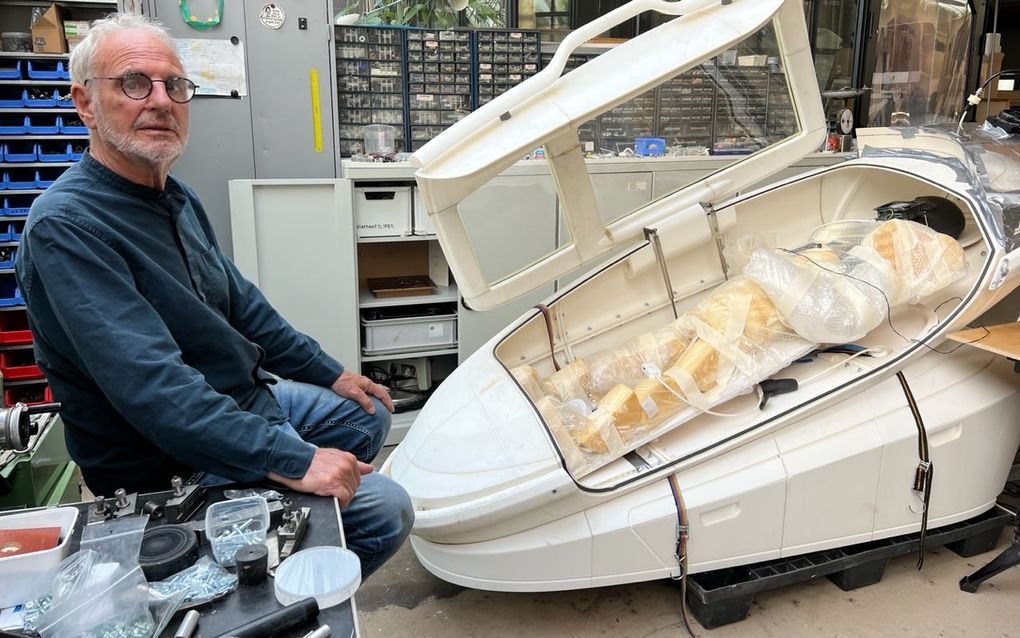
Sarco’s founder, Dr. Philip Nitschke, tested the Sarco in Rotterdam. Photo Last Resort
Central Europe
When it is time to leave this world, most would say that they would want to have a peaceful death. That is why a new invention is set up for release. However, it is not uncontroversial.
Sarco’s founder, Dr. Philip Nitschke, has wanted to guarantee a drug-free departure of life through a 3-D printed capsule called Sarco, despite its legal and ethical questions. According to a recent Swissinfo report, the Sarco is set to be released for usage this year to The Last Resort based in Switzerland. CNE previously reported its initial release in 2021, but it had only been legalised throughout the country, and it was undetermined if any of its clinics would use it.
Despite its availability and growing interest from various human rights organisations, an exact date for its first usage remains unknown. The name is short for sarcophagus or sarcophagi that were used within ancient Egypt and many other cultures in their death rituals.
Legal status
As the Last Resort website states, the Swiss government has not approved the device, but it can still be used throughout the country as long as three factors can be guaranteed when someone wants to use the Sarco:
- The user has to activate the button.
- The user has to possess the mental capacity to end their own life.
- Those providing the Sarco device have to be “altruistic in their motives.”
After Sarco’s first use, the relevant authorities are expected to initiate an investigation into its function and whether it does what it is intended to do.
Dr. Nitschke, the founder of human rights organisation, Exit International, was insistent that those who use the device should not need their doctor’s consent, as he has believed that a dignified death should remain a deeply personal decision.
Once a person climbs inside the Sarco, the user pushes a button which releases nitrogen gas from the floor below. The nitrogen eventually depletes the level of oxygen in the capsule, which leads to unconsciousness and then death in five to ten minutes. According to Exit International’s page on Sarco, the door is not equipped with a lock, and the user can opt out at any time.
Interest
Although it is still unclear as to whether it will be fully accepted in each Swiss canton, some are already showing opposition toward its usage. One media source that was reported by Swissinfo, showed that a person expressed interest in using the Sarco device to end their life. However, a cantonal doctor released a “precautionary ban” on its usage. What’s more, a Schaffhausen public prosecutor has also issued his concerns regarding the device.
“The authorities are waiting for more consistent information and information about the device and its use,” Dr. Cédric Dessimoz said earlier this month. Dessimoz, who is a cantonal doctor from Valais, also said to SRF that Switzerland has a solid legal framework for carrying out assisted suicide procedures in recognised organisations. He was not sure how such organisations would go about their procedures in his country or in Valais. However, Advisory Board Member and Lawyer for The Last Resort, Dr. Fiona Stewart, said that the canton in question is based on incorrect information published in the media about the type of nitrogen used.

Despite misgivings voiced by medical and local leaders, Dr. Florian Willet, co-president of The Last Resort, said that he was confident that the Sarco can be used without legal challenges. If there are, he said that his organisation is willing to go through their team of lawyers and cooperate with any investigations initiated by prosecutors.
“There are people waiting to use it,” he said.
As for Willet himself, Sarco has answered his questions when it comes to planning his death. He said he would use it himself if there were signs that he might lose control over his body. Although his father died from suicide when he was a teen, he said that this has not influenced him from planning to end his own life in the next three to four decades.
“I will use the Sarco myself. It is the most peaceful way to die,” he said.
Permission
The Last Resort was founded this year and is currently working with Exit International in having the Sarco device being loaned out to them. The Last Resort will be the first organisation in Switzerland to loan out the device to interested individuals at no cost.
Although no doctor’s permission is required, A user of the Sarco will need to undergo an assessment by a psychiatrist prior to using the device, Stewart said. According to FAQ section on the Last Resort’s webpage, individuals over 50 years old can take part, but The Last Resort will accept those who are younger in cases of severe physical conditions.
Vulnerable people
While the procedure may be without legal challenges for now, its ethical implications remain under scrutiny among pro-life groups.
Yvonne Geuze from the pro-life organisaiton NPV Care for Life based in the Netherlands, sees the Sarco device as a dangerous tool that can be used to exploit vulnerable people. Those struggling with physical or mental health problems that come with feelings of meaninglessness might be tempted by this device when death sounds like an easy and appealing option.
“Very vulnerable people often don’t get the help they need,” she said to CNE in an interview. “We are all looking for connection with others. That’s also suffering when we don’t have that.”
Geuze mentioned that a lot has been invested in palliative care, where it looks at all aspects of our existence.
“We have to strive for a society in which all people feel welcome and seen, regardless their mental or physical state. How can we help people live and make life more bearable for them? Instead, focusing on the question “how I can help you die?” she said.

Geuze also looks at the issue of assisted suicide as a by-product of living in a post-modern society. If the culture is aligned in a way where a person’s autonomy is paramount without answering to a higher authority, then that person is more likely to choose euthanasia as a way to depart from the hardships of this life. It is important to create certainty: everyone is valued and valuable, no matter what their circumstances are. Opposing assisted suicide also goes hand-in-hand with general suicide prevention, as they both value the gift of life.
However, when a culture aligns itself toward God, Geuze also added that there is hope; even in the most difficult circumstances.
“When you believe in God, you believe that life is a gift and a calling from God,” she said.
Concerns
Geuze had other apprehensions regarding the effect of devices as Sarco on mental health within society. Assisted suicide devices such as Sarco can give people ideas in talking about suicide and potentially create a copycat effect.
“It brings ideas to people. The more options that are seen as normal, the more people will get ideas,” she said.
In addition to the general ethical dilemmas, Geuze also raised concerns regarding the device itself.
“What happens when something goes wrong? What if the amount of oxygen is not low enough? Who will be responsible? There are so many questions,” she said.
Related Articles


